| |
"I'm still digesting it. It had the best [reviews] of my life. I never had a movie welcomed like that. At the same time, the box office in the United States was a disappointment, that's the truth, because those movies are expensive. It will still make tons of money but not enough. The thing I think is that, it was maybe because people were not familiar enough with the universe. And the fact the movie's long. I don't know, it's still a mystery to me." |
| |
Director Denis Villeneuve* |
Note: 2049 is a big movie with big issues at its core. I'm going to spend some time on those issues before chronologically going through this masterpiece and adding my tuppence worth of appreciation. If you want to skip straight to the movie review itself, then drop down to paragraph five. Otherwise, let's talk cinema!
If I may be so bold, itis my humble opinion that Blade Runner 2049 was the foremost mainstream cinematic glory of 2017 with mother! hot on its heels. The keyword in that sentence is 'cinematic'. It reminded us, when we sorely needed reminding, that cinema is not merely the attracting of youthful souls into a popcorn purchasing Pavlovian response. It is an art form that, like music, can penetrate a human mind, strike the match of imagination and let ideas flare and burn so very, very brightly. Blade Runner 2049 is a work of profound vision and heartfelt and authentic query realised with exquisite craft. It placed the best of humanity in the lap of a genetically engineered A.I. and tested it/him to and beyond its/his limits even after the catalyst for his selfless behaviour proved to be illusory. If the 1982 Blade Runner was lacking anything, it was narrative strands that had softer edges, areas where narrative could go and not be defined and resolved by violence or ended with a shot from a blaster. Yes, Deckard and Rachael's ‘romance’ was born from a cold accusation, "How could it not know what it is?" and bloomed after Rachael shot Leon before he could kill Deckard. This blade runner would have qualms retiring a replicant that had just saved his life, a very human response.** And I simply do not buy the coincidental glowing eyes bullshit. I'm with Harrison Ford on this one.
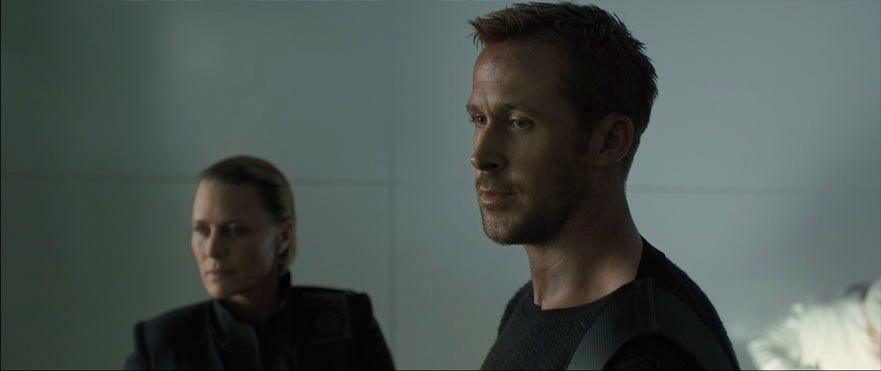
But in 2049, Blade Runner replicant K is slowly humanised by a coincidence and a strong belief in actually being human. If you suddenly believe you are a horse, it makes perfect sense to start eating grass. In the original, replicants like Batty, Pris and Zhora were simply acting out their being human fantasy of their own replicant reality and wanted the real thing and its concomitant lifespan. For reasons that the original and sequel never address, 'real' humans were threatened by their physically superior creations and while Off World seemed to tolerate them as functional necessities (as Star Trek's Guinan said, "a whole race of disposable people..."), Earth could not. What makes us human seems to rely on the definition of what we mean by human. The larger mammals, while wildly and alarmingly diverse, exist by conforming to a set of distinct and unvarying processes. Birth. Breathe. Consume. Excrete. Shelter. Procreate. And not necessarily in that order though number two is always at the top spot. If something physically threatens you, run. If you cannot run, you fight. Life is granted by planned or random procreation but cannot be earned. A right to continue living is granted to no one. Replicants are only less or more than human because humans have made that judgement. You do know that money isn't actually worth anything, right? We all just act like it does.
Let's try an experiment, one at the very heart of Ridleyville (and by extension, Deniscity)? Let's imagine in twenty years that the tools of computer generated imagery and sound manipulation are available to everyone. It's not that far fetched. Remember how quickly digital morphing tools were domestically available months after James Cameron's groundbreaking (for all of five minutes) Terminator 2. Photoshop has rendered the photograph infinitely unreliable. What if we also could never trust digital video or any sound in the same manner as we distrust still photography today? Now, in that precise context, prove your memories are real. Prove that the software in the wetware of your own mind represents a commensurate and roundly experienced reality. Prove you're actually 28 years old and have lived those years and not simply have had the memories implanted after being 'born' from a slippery plastic womb at approximately the physical age of 28, two days ago. Replicant K has been informed of what he is and his acceptance and loyalty to his superiors is unshakeable. He believes he is a replicant and accepts his position in life. I don't know how human mastery over selected modern replicants works (see one of the extra features as Niander Wallace proves that this mastery is absolute) but can free will exert itself because of the reset lever of a different belief? You knew your place, K and now you believe you may be a real human being? How does that change your behaviour? Metaphorically speaking, does that grass look tasty to you now?
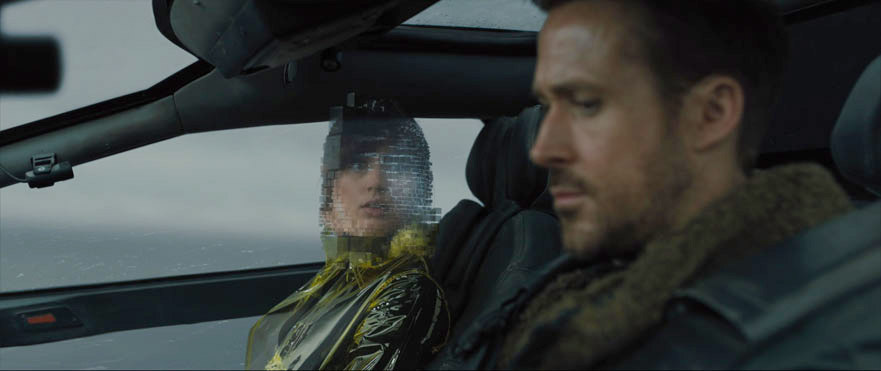
Let's knock 'the soul' on its noncorporeal head. The soul is the invention of religion that primarily stakes a claim for human superiority over all other life forms. The soul, it is ridiculously believed, is the part of the human being that is disembodied and spiritual, the essence of 'you' that isn't a skin suit full of fluids and sweetmeats. It's the ID card that places human beings on a species-governing pedestal. It's how we claim superiority over dogs while I contend the exact opposite is true (that is an issue for another time). I recognise that character and morality may spring from parts of our rational mind and its abrasive contact with experience. This is the human aspect that some of us may interpret as a soul but K's belief in his lack of one is holding him back. I find it a little difficult to believe that Lt. Joshi, the hard bitten, hard drinking police chief would sign up to religious reasons to separate 'us from them' or as she calls it, 'the wall.' K's default melancholia as a replicant is subtly played, almost downplayed. Once 'human' after finding the horse and meeting memory-maker Ana Stelline, he's on a mission to find a father, an action borne of curiosity that smooths his harder edges. After being beaten up by Deckard, he even finds his sense of humour. Fundamentally, it's only K's beliefs that compartmentalise his existence as a replicant or as a human being, nothing more. It's sobering to accept that something as wayward and ephemeral as a belief has so much control interpreting events. A priori deductive reasoning is deemed more of a priority than accepting evidence. As I headed my recent article on freedom of speech, "I don't believe in gravity but I still fall off the roof..." How many roofs must someone fall off to embrace reality? God, this film is like a metaphor lasagne. Layer upon layer of interpretation possible and encouraged. Villeneuve's oeuvre (read that aloud, you know you want to) leads any film commentator to understand that this is a fiercely intelligent filmmaker who cares deeply about his work. He has elevated the cynical idea of 'sequel' with just this one film. So let's get to the work itself.
I'm not going to give you a synopsis this time because I think you'd not be reading this unless you'd seen the film. I'd hate to be the major source of spoilers of a film that you really should see before reading further. There will be no further spoiler warnings.
I love the idea that the first scene is one written for the original film that was never realised. In my recollection, the replicant's serial number was etched into the farmer's jawbone and Deckard had to rip it from the replicant's face to read it. How about that as a start to a movie? This one works just as well. There's no music. K (a quietly impressive Ryan Gosling) is softly confident with a big hand gun and the massive and yet sensitive Sapper Morton (Guardians' Drax, Dave Bautista) knows his time may be up. Sympathies are on both sides (that's very unusual in a movie fight) and K shows that he's been genetically engineered to ignore or cancel out pain. The fight is brutal and short. Morton introduces the theme of the movie, the catalyst for the evolving drama, the miracle of human/replicant procreation. Yes, Ridley, I hear you but I am also trying to ignore you. In my Blade Runner (yes, Ridley, it's yours really...) Deckard is human. But it's immaterial because if replicants can reproduce then there's that soulful wall, just spiritual bricks in ruins at your feet. As Morton hits the floor, the impact disturbs the camera on K. Subtle but a beautiful touch.
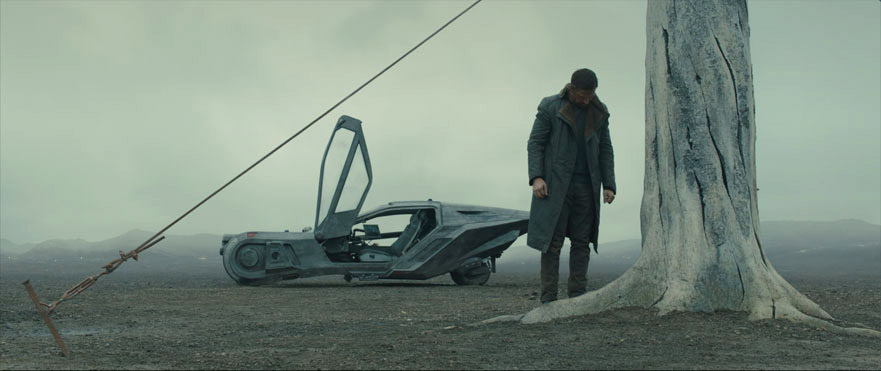
Los Angeles, 2049 is replete with endless rain and claustrophobic human misery not to mention breathtaking production design, masterful miniature work and CG touches. I still don't completely get the reason why K is so hated by his colleagues and neighbours. In the original, 'skin-job' is equated to the 'n' word but it's a little more reasonable (not the right word but you see where I may be going with this) to distrust and fear someone who so definitely belongs to a different culture. Look, they even have a different colour skin! How could they be like us? But replicants (with their superior physical prowess) are like humans enough that who would really care? People must out them in order to hate them so fully because they are human by any other name. Maybe there's a 'replicantist' strata of humanity – haters gonna hate. K goes to the towering HQ of mankind's saviour Niander Wallace to gen up on Rachael and Deckard. Here he meets Luv, a custom replicant, Wallace's angel of (you guessed it) destruction. Here is a replicant with a superiority complex, one that allows her to look down on everyone – except Wallace. The grand creator of the subservient models now cruelly shows us his indifference towards his 'children' by taking out his frustration at his replicants' inability to breed. He slashes a scalpel across the newborn's womb and hell yes, it's supposed to be difficult to watch. This effectively shows you at just what altitude of utter bastardry this guy is flying but then, the movie catches you in a trap. This is a manufactured product, flesh and blood perhaps, but a product. Again, referring to Star Trek The Next Generation's devastating episode Measure of a Man, "Data is a toaster..." By the audience's reaction to the blood pouring down the dying replicant's legs, it's obvious we do not see these 'products' as toasters. Once again, I'm reminded of the Indiana poet James Whitcomb Riley's slice of reason that has become part of our popular culture. "If it walks like a duck, swims like a duck and quacks like a duck, I call that bird a duck." That replicant is human in everything but name. And we bloody know it.
Two things as a short interlude... Why is 'Peter's Theme' from Prokoviev's 'Peter and the Wolf' Joi's activation/deactivation ring tone? It's overtly familiar but its meaning is still a mystery. Less of a mystery is the subtle visible breath of both Luv and K in the vault that "...no one's been down here in ages." Nice. I did not notice this at the two cinema viewings and many other Blu-ray viewings. It makes me think I wasn't watching well enough.
And now, let's acknowledge Blade Runner 2049's most succulent metaphor, an overt classical reference that put an ear-to-ear grin on my face. Hampton Francher and/or Michael Green must take credit for this and I declare undying respect for both for the idea alone. Implanted memories are real or fake (once implanted both become 'fake' to the replicant concerned) and to subcategorise further, they can be real human memories inserted into replicant engram sockets (illegal!) or fake ones. We are talking about ideas that insinuate themselves on to foreign soil, memories into minds both virginal and barren. What better visual representation of something going into something else, invasive but benign, as 'a wooden horse'. Oh, the beauty of the Trojan horse (sans Greeks) would be the medium of memories inserted into a nascent brain. You can stretch the metaphor. The Greeks who go on to sack the city of Troy could be the effect that these memories have on the replicant. K is certainly aware of his status and therefore how 'fake' his memories actually are. Also remember, in this world there are no animals, at least in the cities. That small carving would represent something truly exotic to the person who carved it and its recipient. No wonder it had so much emotional value.
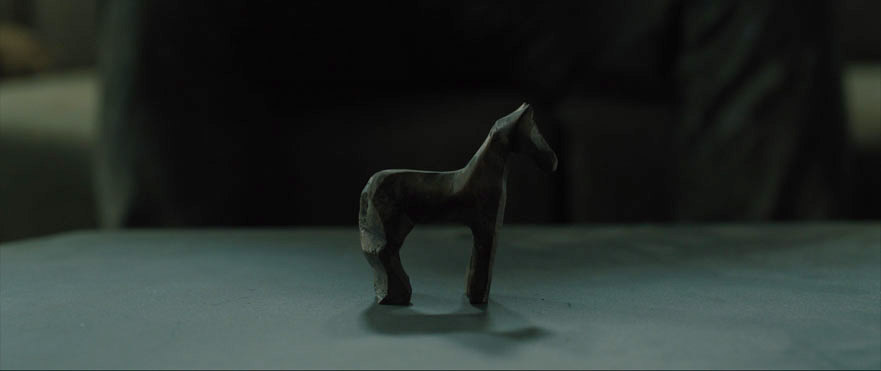
We next see the horse as a holographic representation in Joi's hand. There's her deft flip over to read the date on the underside of its front hooves is the kind of small action that makes rational people fall in love and I love the way this shot breaks the frame line. The camera is late to tilt down but fluidly tilts up an inch to follow the action. Ana de Armas as Joi is heartbreaking in every way in 2049. She is perfectly cast. If you wanted a digital girlfriend, wouldn't she look like Joi? Scratch that. Too narrow a perspective. If you manufactured holographic companions, whom would you want it to look like to appeal to the masses? There. Better. Given the choices of modification open to you, briefly glimpsed as Joi goes from being apartment bound to free contained within a portable 'emanator', I'm assuming all Jois share a basic 'Joiness' that is then slightly altered by personal preference. Hence the pink, dark eyed, giant hologram pointing her finger before the final scenes. She's ready to become the girl of your dreams. In every incarnation, she is adorable, especially that little dance she does that shows up on the rainy streets every so often. The cadence of her accent works as well as Gal Gadot's as Wonder Woman. That we care when Joi is crushed underfoot later in the film is a testament to the effort taken to bring the character to life. On one level, Joi is K's inner life made light.
Once the wooden horse is found, we get a glimpse at just how good Ryan Gosling's performance is. He has just found incontrovertible proof that his implanted memories have a basis in real world physical fact. Just watch him. An explosion has gone off inside him and he strains to keep it inside. It's only when he is told that the memory is indeed a real human memory does that explosion really detonate... "GOD Damnit!" he screams. It's the only time K emotionally lets go completely but if you found out you were actually human and not a replicant, you may be a tad disquieted. I have to mention Joe Walker's assured editing here. If the effect of Blade Runner 2049 is anything, it's down to timing. I remember the first time I saw the unwrapping of the wooden horse. I said to myself 'Not yet... not yet...' because like K, I was letting what it meant slowly sink in. What I meant was that I wanted to be in K's shoes for as long as the penny took to drop. And at the precise frame when I was ready to see K's reaction, Walker cut. I was so in sync with this film and after my umpteenth viewing, still am, perhaps even more so. Another reference that passed me by is his given human name. K I always assumed was a nod to 'Kindred', author Philip K. Dick's middle name. But if we add 'Joe' to K, Joi's suggestion, we get Joseph K (from Franz Kafka's The Trial). and there is only one of those in literature and his story doesn't end well either.
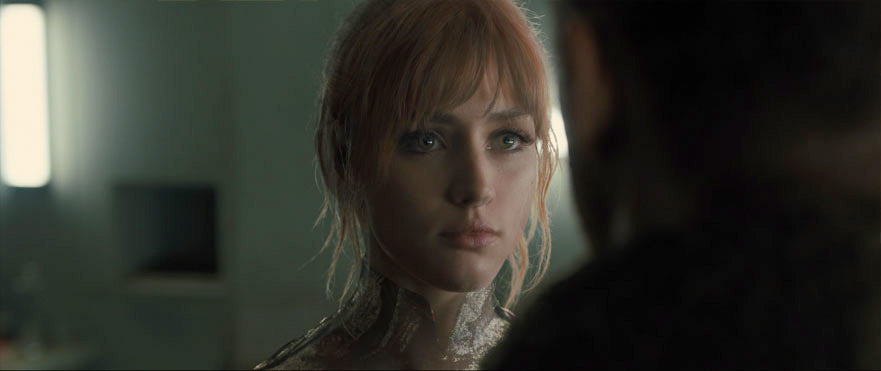
Carla Juri as Dr. Ana Stelline, the provider of fake memories for replicants, is also cast to perfection. If Deckard and Rachael had a baby, there she is, all grown up. The resemblance to her parents is remarkable. The sudden change of environment which is quickly shown to be virtual is quite a shock but her white costume and the environments she creates are sealed off literally as well as metaphorically. Her wistful melancholy compliments K's own, which fits perfectly as they share the same authentic, human memories (which in 2049 is illegal). It seems as if Ana could not resist distributing her inner most thoughts to those soulless souls she services. As she recognises the memory, she is taken over by emotion (how actors do this is beyond me) but with such a small part in such a big movie, Juri makes one hell of an impression. One of the other smaller female parts is the character of sex worker Mariette played by Mackenzie Davis. The combined seduction of K by Mariette and Joi is a scene very much different to most others in the film and for this reason it has its own grace and poetry. Here is a filmmaker hyper aware of what cinema can be and the imagery in this scene is exquisite, both women, replicant and hologram coalescing forming a new third woman. It makes sex about intimacy again rather than physical fulfilment. K's needs as a literal new man are now orchestrated by the woman he could never seduce. Once it's over and we realise that Mariette is a spy, she picks up the wooden horse. I never got what she said as she stroked it on the numerous times I've watched the film but this time, I upped the volume... "It's from a tree..." she says reminding us of the rarity of the object and the genesis of the entire production. I have to praise Sylvia Hoeks' performance as replicant enforcer Luv here as she discovers that to Joshi's knowledge the replicant child has been killed. Her rage and emotional response is utterly believable and switched on in an instant. This is very much a dress rehearsal for her final showdown with K. Actress Robin Wright, playing her dead character, either really smacks her head hard dropped after being hoisted up for eye software recognition or there's some digital tampering. Of all the things in the movie this one got a real "Ow!" response from each audience I saw it with despite the multiple stabbing the character endures while alive seconds earlier.
So after getting the horse examined for clues to its origin (and being offered a real goat in part-ex, a nice nod to the Nubian goat of the novel), K is off to once-radioactive Las Vegas after the detonation of a dirty bomb decades earlier. The visuals in this section of the film are breathtaking. Roger Deakins' work here is stunning and it's well known that like a great stallion, the director let him have his head – no constraints. Villeneuve was gracious enough to suggest that 2049 is a film by both men, sharing equal credit. The coffee table book (which could double as a coffee table) by Villeneuve's partner Tanya Lapointe, The Art and Soul of Blade Runner 2049 has loads of great behind the scenes information including that last remark. It's at this point in the film that the word 'dream' knocks on your consciousness and stays there until the final scene. If you're loving where Villeneuve is taking you then now you are deeply under his spell. It's also here that K encounters animal life for the very first time in the form of hives of bees, hence his rapt fascination. At this point in the film with everything in the air, including the bees, I was putty and I knew (because we all knew) that we were about to meet an old acquaintance...
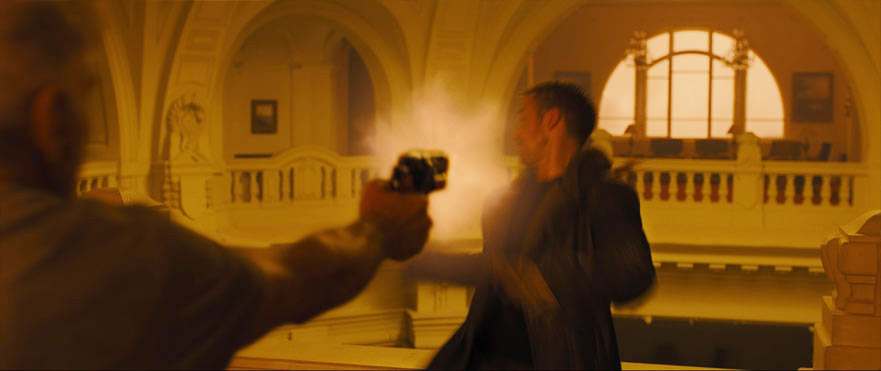
Harrison Ford as Deckard tries awfully hard to kill K, whom he believes has been sent to kill him. The Treasure Island reference highlights narrative parallels of that book's specific chapter with the stalking scene of the movie. It's this scene that really works out your sound system. I used to love the idea of the widest dynamic range but when a gunshot really sounds like a gunshot and a whisper, like a whisper, it's impossible to enjoy these scenes at home without becoming unpopular with loved ones and neighbours. The stalking continues in a nightclub with misfiring holograms as the two men fight, a scene that really does look like it was a vast technical Rubik's Cube of a challenge. I was lucky enough to attend an Editors Guild event in which 2049 editor Joe Walker was a guest. Needless to say 2049 was the main topic of the interview. He explained that Villeneuve almost cut this night club scene out (what?!!) because he felt it wasn't 'Blade Runner' enough. There is humour buried in here, one small aspect I've only just figured out... You can tell I'm inching my way through this film with owl-like attention to detail, can't you. Do you like our owl? Deckard pummels K with punch after punch. K takes every hand to jaw contact with polished stoicism. Elvis fires up behind them starting one of Deckard's favourite numbers starting with the lyric "Take my hand..." That had to be intentional. As I said, layers.
Ford does great work with the sensitive scenes between him and K. Yes, again, the spaces between the delivered words give those words real weight and resonance. But these are two actors riffing off each other, each character having gone from mutual threat to a mutual if begrudging trust. It's a real treat and evokes the maximum dramatic effect with so few words. The explosive kidnap scene is again hugely effective with Ford still revelling in his 'physical acting'. No one throws a punch like Harrison Ford. K, at his lowest ebb (where every hero needs to be at the end of act two), has lost Joi and now, badly injured stares at the sparks from a fire that in a dissolve or morph of true beauty, changes to a grey, abrasive cityscape. It's here that Gosling's skills are put to another test. Of all the drama, personal epiphanies and action K's been put though, he now has to accept that he is not the child of Rachael and Deckard. "You imagined it was you?" This scene head on is played in silhouette as K slumps, again broadsided by a revelation that threatens to change his life profoundly. Instead of accepting his mission from the replicant resistance to kill Deckard to keep the child's identity secret, he shows some humanity by trying to rescue whom he once believed to be his father. None of this is stated explicitly and this is another reason to respect this film's artistry. As Stanley Kubrick once said, "The essence of dramatic form is to let an idea come over people without it being plainly stated."
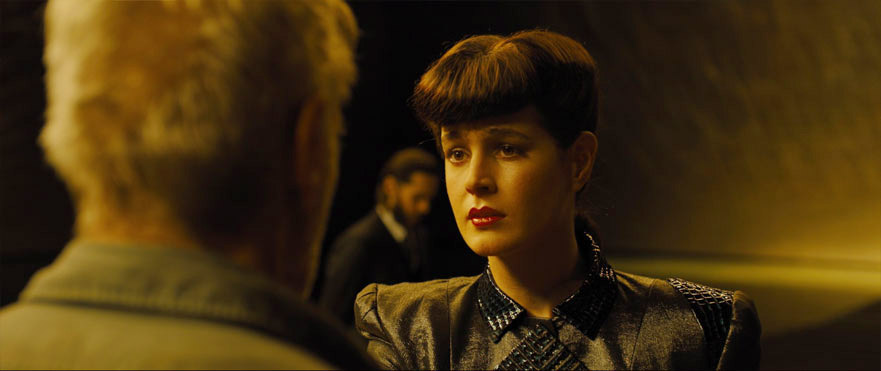
Deckard's meeting with Wallace is a surreal delight but like Rogue One, it asks us to accept a computer-generated simulation of someone we knew so well. In this case, it's Sean Young in her early 80s hey day. It is superbly done and Villeneuve trusts it enough to feature it front and centre but slyly with only one line of her two delivered onscreen. But having seen the real thing so many times and moments before in the same scene, I guess I'm automatically on the look out for any soupçon of unreality. Villeneuve's Rachael is a fantastic doppelgänger, a creation born out of astonishing craft but we're still not there yet. Once the poor girl is despatched, Deckard's future does not look rosy, Off World torture. He will die needlessly as he knows nothing but Wallace is sadistic, determined and angrier than a swarm of irradiated bees.
At this point in the film I would have forgiven Villeneuve anything. On closer inspection, I spotted two narrative speed bumps; I do have to ask how in the world – or even the smoggy skies of Los Angeles – does K manage to find the three spinners (that's the first bump) and then despatch two – how did he know which one Deckard was in? (That's the second). I will conveniently gloss over this because the following action scene is – in one character's case literally – breathtaking and I know I'm running out of superlatives. This is when the score, the sound design, the editing and the mise-en-scene each fire on all cylinders ratcheting up the stakes and the sacrifices. I found Luv's line "I'm the best one!" after stabbing K in so many places to be a perfect set up for her watery demise. Her death and K's triumph is a scene of such power that it left me an exhausted lump in the cinema, muscles scrunched into tense knots. I adored it. I also find this scene intensely moving. Someone (replicant or human, doesn't matter) is doing what's right and the recipient of these acts is utterly unaware of the reasons he's being so well treated and indeed saved. For a brief moment, Pinocchio believed he was a real boy and sought out his father, a prerogative of any orphan. It's to the film's credit that the father never knew why he'd been reunited with his daughter. K is too classy an act for sentimentalism.
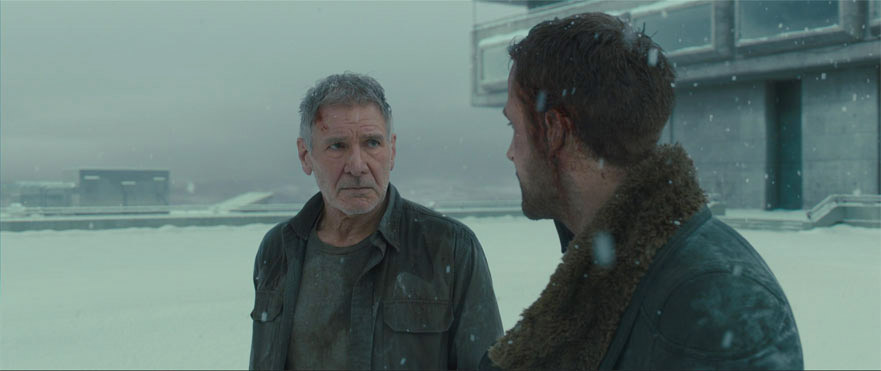
So, to the touching finale. In the snow, K and Deckard regroup. I bet in writing and shooting this scene, the filmmakers were at bursting point to mirror reference the key twist from The Empire Strikes Back. So why did you do this, K? "Because I thought that you were my father!" It's tempting but no. We do get K to smile (as if contemplating the line) but he resists and simply sits on the steps outside the building as it gently snows. This last scene is beautifully written and performed and if there are any tears to be shed, in rain, snow or otherwise, they are over K's handing over the wooden horse to the man who made it and Harrison Ford's subtly emotional reaction at the glass that separates him from his offspring. I'm actually getting emotional writing this. It doesn't help that the hyper-emotional Vangelis' 'Tears in Rain' cue was dubbed over these last moments. Time to die.
"Beautiful, isn't it?" is the last line.
Yes.
Yes, it is.
Wow.
Is that enough? Roger Deakins' 2.40:1 framed photography is glorious. As you would expect, there are no visual flaws in the film. We have long since left dirt and dust behind. Colours, contrast and all round sharpness are all beautiful to behold. The sets and lighting call attention to themselves because they are so unusual but this doesn't detract one bit. And you are given the time to take it all in. The DTS 5.1 surround sound boasts pin-drop clarity with the score sometimes just sliding to a halt below full distort. Yes, a few lines you can only catch if you are really paying attention (there are a lot of accents in this film) but on the whole it's a wonderful mix. Sub woofer, heal thyself.
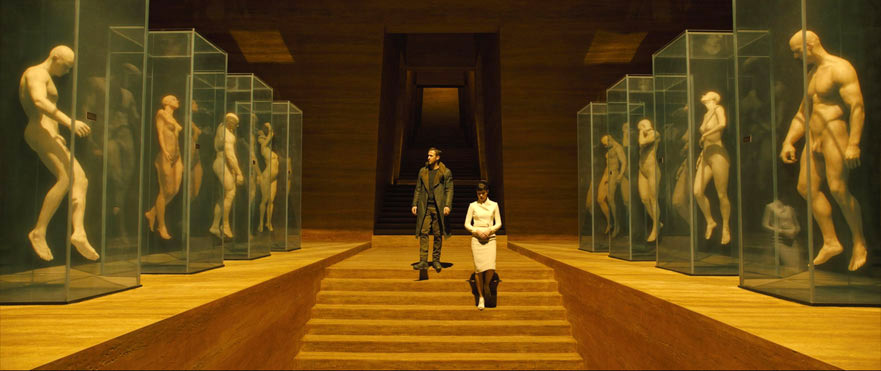
The subtitles come in a multitude of languages and there are subtitles for the deaf and hard of hearing.
Additional Note: Lauren Daigle's 'Almost Human' song, featured on the end credits of the theatrical release has been excised from the Blu-ray with just mixed cues from the body of the film by Hans Zimmer and Benjamin Wallfisch replacing it. I can't seem to find out why...
With one or two exceptions including the Introduction and the Summary, I have left the Extras' descriptions as their basic forms as advertised. If there's something I think I can add to them, then I have. Each Extra title is an accurate indication of what's in store. I only say this because the Extras on the one disc Blu-ray have largely been available online months before the film's release so fans of the film who've already consumed these with enthusiasm may feel themselves somewhat short-changed.
Introduction:
At start up, the disc shows the all-important wooden horse with an expanding red outline as an indication of disc readiness. It's a nice touch.
Designing the World of Blade Runner 2049 (21:55)
What it says on the tin. This is a snapshot of every department's contribution to the visual design of the world of 2049. In 22 minutes. You cannot do this film's design justice in 22 minutes so I'd treat this as a teaser of a longer documentary that's crying out to be made.
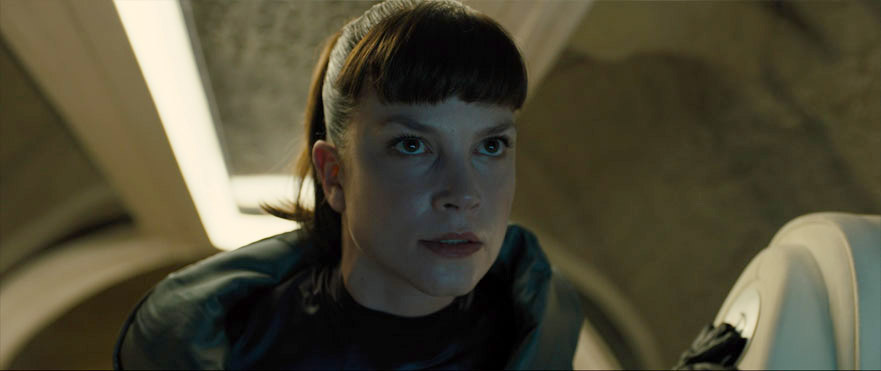
Prologues
These three prequels were initially issued online prior to the film's theatrical release. Each is introduced by director of the main film, Denis Villeneuve. A 'play all' function is included.
2022: Black Out (15:45)
In a stylish animé directed by Shinichiro Watanabe, we learn the story of 'the Blackout' that is repeatedly referenced throughout the main film.
2036: Nexus Dawn (6:31)
Directed by Luke Scott (son of Ridley, keep it in the family), this live-action short recounts how genius industrialist Niander Wallace, after acquiring the Tyrell Corporation, was able to lift the prohibition on manufacturing replicants.
2048: Nowhere to Run (5:49)
Also directed by Luke Scott, this second live-action short is set one year before the film opens and reveals how Sapper Morton fled Los Angeles for the remote farm to which K eventually tracks him.
Blade Runner 101 (11:22)
This is a series of short featurettes on various aspects of the Blade Runner universe and the film's design. A 'play all' function is included. These are all tantalisingly short with the same swiftly cut montage at the start of each (the titles are self-explanatory); Blade Runners, The Replicant Revolution, The Rise of Wallace Corp., Welcome to 2049, Jois, Within the Skies: Spinners, Pilotfish and Barracudas.
Hand on heart, I have to say that this was my most anticipated movie of 2017 and after the reviews came in, one rave cascading after another, I could hardly contain myself. I am stunned that it lived up to and surpassed my expectations. Yes, I have found defending its length a little wearying. Ridley Scott is quoted on the film's Wikipedia page saying that he would have cut 30 minutes and that this was the reason for its failure. As one of the film's producers, I find Scott's lack of support for his director more than a little sad, almost a betrayal. Hindsight is a wobbly platform from which to dispense such judgements. Original Blade Runner producer Michael Deeley is just as scathing about Villeneuve's decision to give the film enough time to let the glorious images and ideas breathe. He cites this indulgence as irresponsible as you can only show a film of a certain length, a certain number of times a day. I find this argument somewhat ridiculous. If someone wants to see a film, they go and see it. And if enough keep coming, the film stays on screen. It's certainly a best-selling Blu-ray (at number two in the charts just behind It back in April. In US charts right now it sits happily at No. 5) and after the dust has cleared the investors will make their money back. As for the length argument, this is art, people. Editor Joe Walker respects the time these images and evoked emotions take to be respectively savoured and conjured up. Together with Villeneuve, he has fashioned a long film but a long film for the most important reasons. No one whines about bubblegum pictures cruising past the two and a half hour mark with abandon. Avengers: Infinity War is a shade shorter but that's one explosive set piece after another requiring no thought or expenditure of intelligence. Marvel goes "Yee ha!" Villeneuve goes "Let's think about that..." And those that do think, find depths in this film, a work that does what cinema does best. I cannot recommend this disc highly enough and what more could you possibly want for under a tenner?
|